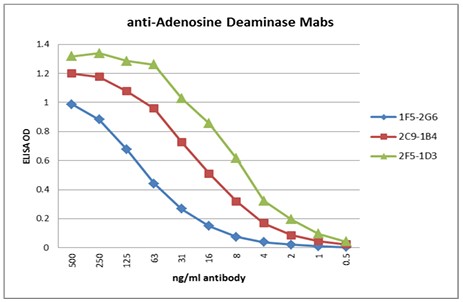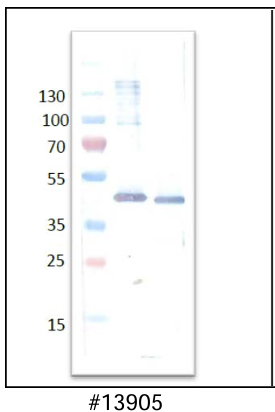Anti-Adenosine deaminase Antibody (13905)
Anti-Adenosine deaminase Antibody (13905)
Product No.: 13905
- -
- -
Clone 2F5-1D3 Target Adenosine deaminase Formats AvailableView All Product Type Monoclonal Alternate Names EC 3.5.4.4, Adenosine aminohydrolase Isotype Mouse IgG1 Applications ELISA , WB |
Data
- -
- -
Antibody DetailsProduct DetailsReactive Species Human Host Species Mouse Immunogen Native ADA purified from calf spleen and recombinant human ADA. Product Concentration Lot Specific Formulation This monoclonal antibody is formulated in phosphate buffered saline (PBS) pH 7.2 - 7.4 with no carrier protein or preservatives added. State of Matter Liquid Product Preparation Antibodies are purified by a multi-step process including the use of protein A or G to assure extremely low levels of endotoxins, leachable protein A or aggregates. Storage and Handling Upon initial thawing, appropriately aliquot and store at -80°C. For long-term storage, keep at -80°C. Avoid repeated freeze-thaw cycles. Country of Origin USA Shipping Next Day 2-8°C Applications and Recommended Usage? Quality Tested by Leinco ELISA: Recombinant human ADA coated on the solid phase at 0.5ug/ml.
Immunoblotting: use at 200ng/ml. A band of ~38kDa is detected. These are recommended concentrations. Endusers should determine optimal concentrations for their applications. Each investigator should determine their own optimal working dilution for specific applications. See directions on lot specific datasheets, as information may periodically change. DescriptionDescriptionSpecificity This antibody is specific for both native and recombinant ADA. Background Adenosine deaminase (ADA) is a purine catabolic enzyme which irreversibly deaminates adenosine and deoxyadenosine. It is needed for the breakdown of adenosine from food and for the turnover of nucleic acids in tissues. ADA deficiency (due to mutations in the ADA gene) results in severe combined immunodeficiency (SCID) as a result of accumulation of deoxyadenosine which, in turn, leads to (1) a buildup of dATP which inhibits ribonucleotide reductase and prevents DNA synthesis; since developing T cells and B cells are some of the most mitotically active cells, they are highly susceptible to this condition, and (2) an increase in S- adenosylhomocysteine since ADA is important in the purine salvage pathway; both substances are toxic to immature lymphocytes, which thus fail to mature. Function Catalyzes the hydrolytic deamination of adenosine and 2-deoxyadenosine (PubMed:8452534, PubMed:16670267). Plays an important role in purine metabolism and in adenosine homeostasis. Modulates signaling by extracellular adenosine, and so contributes indirectly to cellular signaling events. Acts as a positive regulator of T-cell coactivation, by binding DPP4 (PubMed:20959412). Its interaction with DPP4 regulates lymphocyte-epithelial cell adhesion (PubMed:11772392). Enhances dendritic cell immunogenicity by affecting dendritic cell costimulatory molecule expression and cytokines and chemokines secretion (By similarity). Enhances CD4+ T-cell differentiation and proliferation (PubMed:20959412). Acts as a positive modulator of adenosine receptors ADORA1 and ADORA2A, by enhancing their ligand affinity via conformational change (PubMed:23193172). Stimulates plasminogen activation (PubMed:15016824). Plays a role in male fertility (PubMed:21919946, PubMed:26166670). Plays a protective role in early postimplantation embryonic development (By similarity). {UniProtKB:P03958, UniProtKB:P56658, PubMed:11772392, PubMed:15016824, PubMed:16670267, PubMed:20959412, PubMed:21919946, PubMed:23193172, PubMed:26166670, PubMed:8452534}. NCBI Gene Bank ID UniProt.org Research Area Enzymes References & CitationsTechnical ProtocolsCertificate of Analysis |
Formats Available
 Products are for research use only. Not for use in diagnostic or therapeutic procedures.
Products are for research use only. Not for use in diagnostic or therapeutic procedures.




